 | The Xenophile Historian |

 |
 |
 |
 |
 |
 |
 |
 |
 |
 |
 |
 |
 |
 |
 |
 |
 |
 |
 |
 |
 |
 |
 |
 |
 |
 |
 |
 |
 |
 |
 |
 |
 |
 |
 |
 |
 |
 |
 |
A History of Europe
Chapter 4: THE PAX ROMANA
27 B.C. to 180 A.D.

This chapter covers the following topics:

Caesar Augustus
27 B.C. to 14 A.D.
Octavian spent the first three years after his defeat of Antony organizing the east, demobilizing half the army (he reduced the number of legions from 60 to 28), and finding land for 120,000 veterans. During this time he held the title of consul. In 27 B.C. he held a carefully staged meeting, in which he told the Senate that he had restored the Republic; then, because the crisis that brought him to power was over, he offered to resign. The Senate did not accept this offer, because it had no one to take his place, and it knew it could not really oppose Octavian's wishes, so it asked him to stay and bestowed on him various offices of state. The truth of the matter was that Octavian only restored the Republic outwardly, blending republican institutions with his strong personal leadership. He gave the Senate considerable authority, consulted it on important issues, allowed it to retain control over Italy and half the provinces, and gave it the legislative functions of the nearly defunct Tribal Assembly. By doing all this he avoided Caesar's mistake, and never gave the appearance of becoming a monarch for life. The Senate in return bestowed upon Octavian the title Augustus ("The Revered," a title previously used for gods), the name we have called him since.(1)
During the rest of his long reign, Augustus never again held the office of dictator, and he seldom held the consulship. However, he kept the power of a tribune, which gave him the right to initiate legislation and to veto the legislative and administrative acts of others. He also kept the governorship of Egypt, which had most of the grain, and the "more difficult" provinces on the frontier, which had most of the legions. From his title imperator, which formerly meant dictator, is derived our modern term emperor.
Augustus made an effective compromise between the need for a strong head of state and the sentiment for Rome's republican institutions. He had the power once given to kings, but preferred the modest title of princeps, "first citizen," so we know his form of disguised dictatorship as the Principate. He also refused to live extravagantly, continuing to wear a toga instead of a robe and crown, though he made a few concessions to protect his delicate health.(2) All this made it look like political power was evenly divided between the princeps and the senatorial aristocrats. Most of Augustus' successors continued this arrangement during the next two centuries.
Because Augustus faced the problem of removing the scars from a century of civil strife, he concentrated on internal reform. He did not neglect foreign affairs, though. Besides giving the Empire internal peace, he gave it sensible frontiers. Neglected enclaves in Spain and the Alps were pacified(3); the main advance was in central and eastern Europe, where his generals pushed all along the front from the Adriatic coast to the Danube. This created several new provinces: Moesia (29 B.C.), Noricum (16 B.C.), Raetia (15 B.C.), and Pannonia (10 A.D.). The only land south of the Danube that remained independent was Thrace. In the East, besides Egypt, Augustus annexed Galatia (25 B.C.), Paphlagonia (6 B.C.), and Judaea (6 A.D.). This left Pontus (reestablished as a kingdom by Antony), Lycia, Commagene, Cappadocia and Armenia; the Parthians would not tolerate a Roman conquest of these areas, but they agreed to let them become Roman client states.
The simplification of the frontier suggested the creation of an additional line of defense--an eastward advance from the Rhine to the Elbe. The conquest of most of Germany was accomplished between 12 B.C. and 5 A.D. At this point a revolt broke out in the valley of the Sava river (modern Croatia and Bosnia), and Augustus, feeling that his Balkan conquests required more digestion, called off the German offensive and transferred some troops to the Danube. The three legions remaining in Germany were ambushed and destroyed in Teutoberg Forest by a local chief named Herman (9 A.D., the Romans called him Arminius). The Roman commander, Publius Quinctilius Varus, fell upon his sword before the massacre was over; Arminius sent his head as a war trophy to the Marcomanni, the most advanced tribe in the region, and the king of the Marcomanni passed it on to Rome.
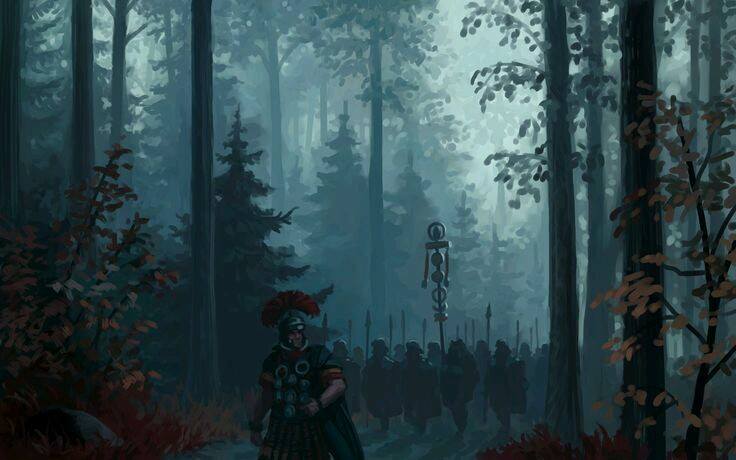
Augustus was deeply traumatized by this defeat; for the rest of his life he remembered the anniversary of that battle as a day of mourning, and according to the historian Suetonius, "he would often beat his head on a door, shouting: 'Quinctilius Varus, give me back my legions!'" After that he gave up all ideas concerning future expansion, and instructed the next emperor, Tiberius, to do the same. Thus, the boundary between the Germanic languages of the north and the Romance languages of southern Europe is still the Rhine and the Alps. In other words, the battle of Teutoberg Forest created Germany. Recently Herbert W. Benario, an emeritus professor of classics at Emory University, pointed out that if the Romans had won there, the Germans, like the Celts, would have been civilized along Roman lines, the Reformation and the Thirty Years War probably would not have happened, and the long, post-Roman conflict between France and Germany, culminating in the Franco-Prussian War and two World Wars, might never have taken place.(4)
Augustus put most of the legions in frontier provinces, to keep them out of Roman politics. At the time of his death, their campsites were in the following locations: three in Spain, one in North Africa, eight along the Rhine, four in Dalmatia, three along the Danube, four in Syria and two in Egypt. To garrison Italy and protect the emperor's person, the equivalent of a twenty-sixth legion, the Praetorian Guard, was raised and based in Rome. Each legion had 5,000 men, and was divided into ten cohorts of 480 each, plus commanding officers and secretaries. All of the 130,000 soldiers in the legions and Praetorian Guard were Roman citizens, and to employ useful non-citizens, an equal number of auxiliary troops (provincials and sometimes even barbarians) were organized into cohort-sized units, and stationed in roughly the same places as the legions. More than forty colonies of retired soldiers were founded throughout the Empire; among them was Palermo in Sicily, Philippi in Macedonia, Patras in Greece, and Baalbek in Syria.
Augustus also sought to cure a sick society--to end the mood of utter hopelessness felt by many concerned Romans, like the poet Horace:
"Time corrupts all. What has it not made worse?
Our grandfathers sired feebler children; theirs
Were weaker still _ ourselves; and now our curse
Must be to breed even more degenerate heirs."(5)
Through legislation and propaganda, Augustus sought to check moral and social decline and revive the old Roman ideals and traditions. He was the first Roman head of state to patronize literature, and during his reign it really took off with famous authors like Livy, Virgil, Ovid, and Horace. To find them, Augustus used a close friend, Gaius Maecenas, as a talent scout, and he also financed much of their work. Most of them supported their patron and the princeps with patriotic poems and histories, though Ovid was later exiled to the Black Sea because his manual on sex & dating, The Art of Love, offended Augustus. Virgil was working on the greatest Roman epic of all when he died in 19 B.C. He left orders to burn this poem if he failed to complete it, but Augustus would have none of that, so the Aeneid is still around for us to read.
Upon the death of an old rival, Marcus Aemilius Lepidus, in 12 B.C., the title of Pontifex Maximus passed to Augustus, and henceforth, every emperor would automatically hold this position. The honor pleased Augustus, and to fulfill that role, he repaired 82 deteriorated temples, built new ones (which included one to the deified Julius Caesar), revived old priesthoods, and restored religious festivals. The most important of the new temples was the Pantheon (described below), and an elaborate altar called the Ara Pacis (Altar of Peace), which signified the beginning of a new era because it was built in a corner of the Campus Martius, the field where soldiers used to train and assemble in the early days of the Republic.
Augustus sought to reestablish the integrity of the family by legislating against adultery, the chief grounds for divorce, which had become commonplace during the late Republic. A permanent court was set up to prosecute adulterous wives and their lovers, even those in the imperial family. Other laws rewarded the parents of large families, because the declining birthrate among Italians was becoming a serious concern by this time. To keep the common people happy, he built public baths and basilicas, triumphal arches, theaters and aqueducts (all this, not incidentally, lowered unemployment and bolstered the economy), and lavishly provided "bread and circuses" to the masses. Finally, to disarm the gangs that had been terrorizing citizens, he outlawed the carrying of daggers.
The forum, a combination marketplace and meeting area, was considered the most important part of Rome. In Julius Caesar's time the original forum, the Forum Romanum, could no longer handle the crowds that frequented it, so Caesar built a second forum. Augustus added a third one, and three later emperors (Vespasian, Nerva and Trajan) built fora of their own. Trajan's was the grandest of all; he had to tear down Nero's Golden House to make room for it. After his reign the city stopped growing, so there never was a need for a seventh forum.
Unfortunately, no one in the imperial family was very fertile--not a good sign when one is trying to start a dynasty. Julius Caesar, for instance, only had two children: his daughter Julia and the ill-fated Caesarion. The only child of Augustus was another Julia. Augustus married her to her cousin Marcellus, but Marcellus died before they had any kids. The next husband was Marcus Agrippa, the right-hand man of Augustus. Before Marcus died in 12 B.C., he and Julia had five children, but the two boys also died young.
Meanwhile, Augustus' wife, Livia, had two sons from her first marriage, Tiberius and Drusus. After the death of Marcus Agrippa, Augustus commanded Tiberius to divorce his own wife, though she was pregnant, and marry Julia. Then when Drusus died, Augustus commanded Tiberius to adopt the son of Drusus, Germanicus, just as he had adopted Tiberius. However, Tiberius and Julia did not get along, so all these arrangements did was raise tensions in the family. In 6 B.C. Tiberius left for Rhodes to get away from Augustus, and Augustus refused to have him back until 2 A.D.; by then the two sons of Marcus Agrippa were dead, so Tiberius was the only heir that Augustus had left.
Julius Caesar's dazzling talents had kept the Mediterranean world in turmoil, while the grey genius of Augustus created peace and prosperity, and the political machinery to continue it. In his time they called the new peace the pax Augusta; gradually, when people realized that the new institutions didn't depend on one man to keep going, the term pax Romana replaced it as the name for Rome's best years. Augustus is remembered today as Rome's best emperor for four reasons: he had one of the longest reigns, he used men well, he avoided spectacular stunts, and he died in bed. At the end, his last words were, "Have I acted out the comedy well?"
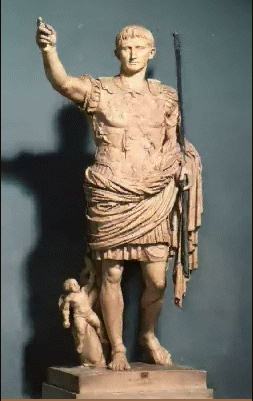
14 to 37
The governmental machine created by Augustus continued to function smoothly during the reigns of the four relatives who followed him. Augustus had not left a constitutional formula for choosing a successor--this was a difficulty that would always plague the principate--but nobody disputed the succession in this case, since it was clear he had chosen his stepson Tiberius for the job. Tiberius had gained much useful experience during the lifetime of Augustus, and was a competent administrator and a military commander, but he also proved that not all principes are equal; he squandered much of the good will his stepfather had collected. Grim and gloomy, unpopular, and 55 years old at the time he succeeded Augustus, he was a disgusting paranoid who disposed of anyone he suspected of treachery. "Not a day passed without an execution," the historian Suetonius wrote, "not even days that were sacred and holy, for he put some to death even on New Year's Day. Many were accused and condemned with their children and even by their children. The relatives of victims were forbidden to mourn for them . . . The word of no informer was doubted."
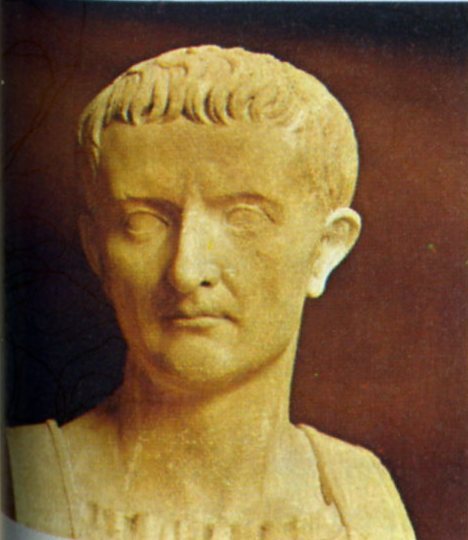
By contrast, the new emperor's stepson, the previously mentioned Germanicus, was much liked by the Roman people. Not only was he handsome and virtuous, as commander of the Rhine legions, he led more than one successful campaign into Germany (14-16). While these campaigns did not add any territory to the Empire, the Germans were beaten with only minor losses to the legions, and in Teutoberg Forest, the remains of the soldiers killed there were found and given honorable burials. Best of all, the eagle standards of those lost legions were recovered, and that helped Rome get over the shock of the previous defeat. However, Tiberius saw the campaigns as going against the advice Augustus gave about leaving Germany alone, so he recalled Germanicus and gave him a new assignment, in Asia. Here he brought two client kingdoms under Roman rule (Cappadocia and Commagene), but then in 19 he suddenly fell ill and died. Because of the questionable circumstances, many suspected that either Tiberius or his right-hand man Sejanus (see below) had Germanicus killed, to keep him from becoming the next emperor.
Judging Tiberius is difficult, since all historians from the first and second century despised him. On a positive note, he did run the Empire efficiently; every part of it was at peace, and the imperium ran lean and mean, without squeezing much in taxes from the provinces. It was during his reign that both John the Baptist and Jesus were executed in the Holy Land. We don't know if Tiberius heard about any of the events that were written down in the Gospels of the New Testament; if he did, he would have figured that the deaths of John and Jesus nipped some revolts in the bud.
Tiberius spent the last eleven years of his reign on Capri, an offshore island near Naples; this became the only place where he felt safe from his enemies. During this time he scandalized Rome by fooling around with boys, while the government was left in the hands of the only man he trusted, the commander of the Praetorian Guard, Lucius Aelius Sejanus. Ironically, Sejanus was doing everything he could to make himself the next emperor. When he first took charge over the Guard, Sejanus became an enemy of Nero Claudius Drusus, the only child of Tiberius; that feud went on until Sejanus poisoned Drusus in 23. Then when Tiberius considered the three sons of Germanicus as possible heirs, Sejanus accused the two elder ones of immoral acts, which eventually led to their executions. The third son, Gaius Caesar (the future Caligula), was only spared was he was a minor at the time. And we believe Sejanus persuaded Tiberius to move to Capri, so he could act without any supervision. Oh, there were times when Tiberius considered returning to Rome, and the people expected him to do so, but his fears always overcame this urge, so he stayed on Capri.
By 31, Sejanus was a co-consul, along with Tiberius, and he was trying to marry into the imperial family. At this point, though, Tiberius found out about his activities, and had Sejanus put to death. Another bloodbath followed, as Tiberius ordered anyone associated with Sejanus be put on trial for treason. After this, he still did not leave Capri, which he had turned into a one-man heaven for himself, but he did not choose anyone to carry out his duties for him, either, so for the next six years the Empire was effectively leaderless; only the still-functioning bureaucracy gave the illusion that everything was all right. Tiberius named his grandnephew Gaius Caesar as his heir, and ordered Gaius to live with him on Capri. Somehow Gaius avoided becoming a target of the emperor's paranoia, though they never got along very well. Finally in 37 Tiberius died, reportedly smothered in bed because Gaius was impatient for his turn on the throne.
37 to 41
The death of Tiberius caused Rome to rejoice; Romans felt that after their experience with Tiberius, the next emperor just had to be better. No such luck. Gaius, better known as Caligula(6), was downright insane. At first he made himself popular by banishing the informers of Tiberius, releasing political prisoners, ending the treason trials, restoring the independence of Commagene, lowering taxes, raising the pay of soldiers and the Praetorian Guard, and throwing lots of games. To top all this off, he remembered the reforms Julius Caesar and Augustus had made to the calendar, so he renamed September after Germanicus. However, he had never been given any training or responsibilities before becoming emperor; this was the first and only real job in his life! Even worse, he knew he had unlimited power over his subjects, and used it. His imperial policy was simple: give the people--and himself--anything they wanted.
The honeymoon between Caligula and his subjects lasted for six months, and then he suffered a serious illness. It was so bad that some upper-class Romans prayed, asking the gods to take their lives instead of the life of the emperor. It looks like the illness may have caused Caligula to become completely unhinged. When he recovered, he ordered those who prayed for his recovery to commit suicide, so that their prayers about offering their lives in exchange would be fulfilled. His sister Drusilla was married to a former consul, but Caligula abducted her and made her his mistress, whispering to her sweet nothings like, "Off comes this head whenever I give the word." When she died, he ordered her deified, the first time a woman received such an honor. Not willing to wait until after his death to be worshiped as a god, he ordered the heads knocked off statues of gods, replacing them with his own likeness. When he exhausted the treasury with his extravagance, he ordered rich men to bequeath their wealth to the state--or he would kill them and confiscate their property anyhow.(7)
Caligula embarrassed the whole Empire with his public stunts. Once he named his favorite racehorse consul, dressing it in a royal purple blanket when he introduced it to the Senate. Another time he sent an army to conquer Britain. It got as far as Belgium, but could not cross the English Channel, because nobody brought any boats. Not willing to go home empty-handed, Caligula ordered his soldiers to fill their helmets with shells, and back in Rome he demanded a parade for having conquered the sea!
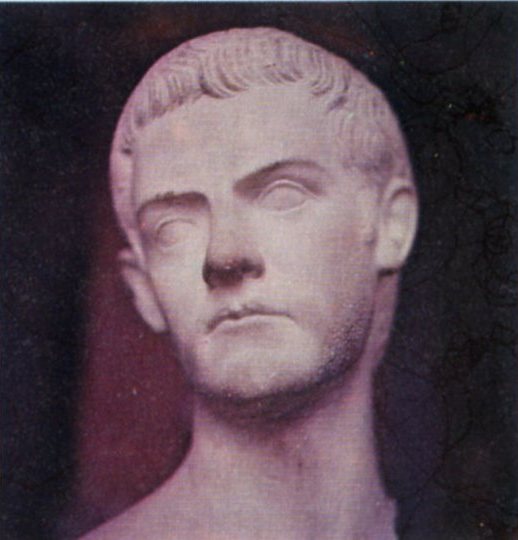
Some Praetorian guards who could no longer stand his antics murdered Caligula in 41. He never named a successor, so the Empire not only had no emperor, but not even an appointee. The Senate, which had been dormant since the time of Augustus, decided this was a good time to bring back the Republic. While it debated who should become head of state, the Praetorian Guard decided to pick its own emperor. Roaming through the palace, some guards found Claudius, the fifty-year-old uncle of Caligula, hiding in fear for his life behind a curtain. No better candidate turned up, so they took Claudius to their camp and proclaimed him emperor. The Senate was persuaded, by both the words of Herod Agrippa(8) and the spears of the guards, to accept Claudius.
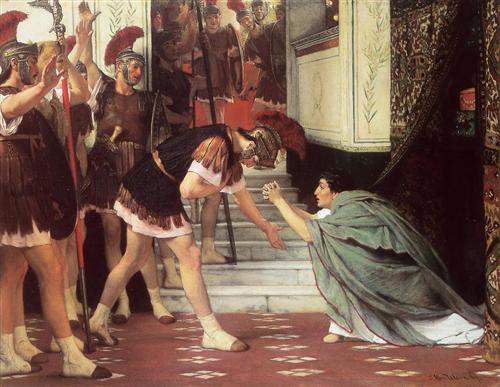
41 to 54
Claudius was an unlikely candidate for emperor. He stammered and was subject to nervous twitching; his grandfather Augustus acknowledged that the boy had brains, but didn't want him to appear in public, "lest he do something that could be seen and laughed at." He spent most of his early adulthood out of public view, devoted to scholarly works; he studied phonetics and philology, and wrote a forty-one volume history of the Etruscans, and an eight-volume history of the Carthaginians; unfortunately, neither work exists today (What wouldn't I give for a copy of those!). The Praetorians probably made Claudius emperor because they thought he would be a pliable tool, under their control. But as emperor (41-54), he showed much initiative and turned out to be the best ruler since Augustus, leading some modern historians to wonder if his physical ailments were really an act, to keep from being next in line for assassination. And there were assassination plots throughout his reign, because a lot of Romans refused to be convinced that Claudius was not a bumbling fool.
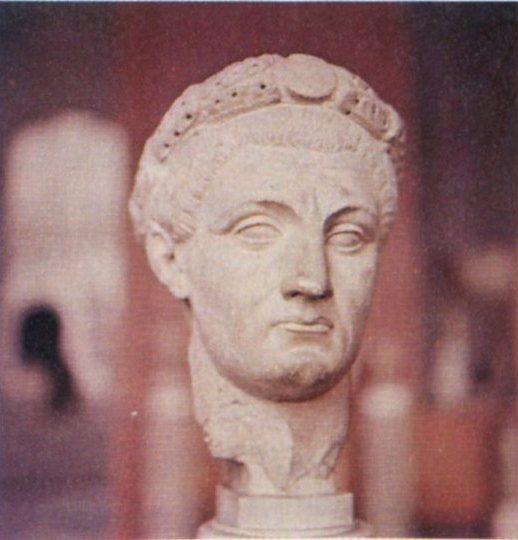
The greatest accomplishment of Claudius was the conquest of Britain. This was an overdue project, for Guiderius (Gwydr), king of the Britons since 12 A.D., had never paid tribute to Rome. Now that Spain and Dalmatia were quiet, Claudius could withdraw a legion from each, and then recruited two more. Four legions and 20,000 auxiliaries from Gaul turned out to be just enough for the task. Crossing the English Channel in the spring of 43, they killed Guiderius at the battle of Portchester. Guiderius' brother, Arvirargus (Caratacus in some texts), promptly took the crown, but for him it was a losing battle. By August Claudius had arrived from the Continent, and he led the legions into Camulodunum (Colchester), the headquarters of Arvirargus' tribe, the Catuvellauni. In 44 one legion stayed behind in Camulodunum while the other three fanned out across England, in pursuit of Arvirargus, who had fled to Wales. Vespasian, the general commanding the 2nd (Augusta) Legion, had to fight the Durotriges and the Dumnonii in the southwest, a Druid stronghold, but the other tribes, glad to be free of Catuvellaunian rule, submitted to the Romans. By 47 Rome had all of southern England.
For a brief time the Fosse Way, the military road built to link the camps at Exeter and Lincoln, served as the frontier of the province. It wasn't the frontier for long because Arvirargus recruited five tribes in Wales to support his anti-Roman cause, and in 47 he launched a guerrilla war against both the Romans and the nearest pro-Roman tribe, the Cornovii. Arvirargus usually won when leading such raids, but he could not avoid a pitched battle forever. The big battle came in 50, as the Romans advanced their line to the Welsh border; it was a fierce struggle, but in the end Rome won the victory. Arvirargus escaped a second time, this time to the Brigantes. This tribe in northern England was not yet under Roman rule, but its wily queen, Cartimandua, knew that her future lay with Rome, so she handed over Arvirargus and his family to the Roman governor.
Arvirargus persuaded Claudius to spare him in a speech that was both proud and eloquent; thus he and his family managed to live out their lives peacefully in Rome. Back in Britain the legions halted; their campsites at Lindum (Lincoln), Deva (Chester), Glevum (Gloucester) and Isca (Caerleon) became permanent bases for a generation. Wales, northern England and Scotland remained independent, while Londinium (London) became the provincial capital; the British royal family became puppet kings for the rest of the Roman era.(9)
Elsewhere, the absorption of protectorate states continued at a steady rate under the Julio-Claudian emperors. Tiberius annexed Cappadocia, as noted above, Caligula took Mauretania, Claudius added Thrace and Nero grabbed Pontus.
Claudius also resumed the advancement of citizenship begun by Julius, by allowing Gallic chieftains to become senators. Now there was no turning back; anyone of ability had a chance to earn Roman citizenship. The author Petronius wrote a believable satire about an Asian king who became a slave in Rome so that someday, after regaining his freedom, he could become a Roman citizen and advance to a better position in the world than he had originally. Pliny noted that an official who oversaw Rome's grain supply was "descended on his father's side from a tribe that went about in skins." From now on the word "Latin" was no longer a geographical term pertaining to central Italy, but described anyone who had full citizenship and embraced the Latin culture.
Despite his accomplishments, Claudius was remarkably unwise in his choice of wives. He had two failed marriages while Tiberius was emperor; the first wife, Plautia Urgulanilla, was divorced for adultery, and he divorced the second, Aelia Paetina, when she became a political liability (she was a relative of Sejanus). His third wife was Valeria Messalina, the worst woman in Rome, who went on a sexual spree that the whole city heard about. Claudius had to execute her when he heard about her plotting to replace Claudius on the throne with her latest lover. Then he married Agrippina the Younger, his own niece and the sister of Caligula. This ambitious woman had a son from a previous marriage named Nero, and she bullied Claudius into passing over his own son, Britannicus, to make Nero his heir. Then she reportedly fed Claudius some mushrooms poisoned with arsenic before he could change his mind.
54 to 68
Nero, who was seventeen years old at the time, was more interested in the arts than administration. Within a year he poisoned Britannicus, then he decided that his mother was too bossy and should also be dispatched, but because she had done so much to get him the throne, he didn't want her to suffer. First he tried poison, but Agrippina, alerted by the fate of Britannicus, had made herself immune by taking small doses of the same poison previously. Then Nero arranged for the ceiling of her bedroom to collapse on her when she got into bed. Anyone who has watched the Roadrunner and Wile E. Coyote knows contraptions like that don't work; she escaped by jumping behind a couch, and some servants were killed instead. Next, Nero sent her cruising in a ship constructed to fall apart at sea, but she swam to shore and sent Nero a note that she was safe. This was too much, and Nero told an ex-slave, Anicetus, to do anything, so Anicetus beat Agrippina to death with a club.
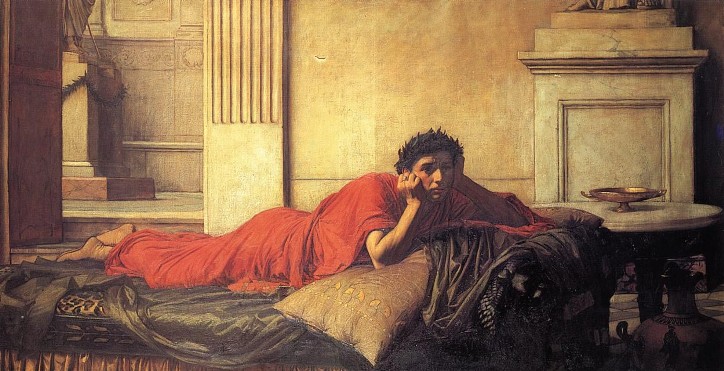
Despite this start, Nero's early years were not bad. The young emperor lowered taxes, decreed old-age pensions, performed well as a judge, showered the poor with benefits, and appointed talented governors. During this time, his evil tendencies were held in check by his tutor and advisor, a stoic philosopher named Lucius Annaeus Seneca. A profitless ten-year war with Parthia over Armenia ended in 63, when Nero agreed to a compromise that made a member of the Parthian royal house king of Armenia, though Armenia remained a Roman protectorate.
Nero fancied himself a musician and an actor. The first time he came on stage, at Naples, the crowd laughed and cheered, not because they liked the performance, but because an actual emperor would perform before them; acting was not yet a respectable profession. This encouraged him to give more public performances, which outraged many Romans. The unashamed emperor staged music contests, in which he usually won the prizes, and he made attendance compulsory. "While he was singing," Suetonius wrote, "no one was allowed to leave the theater even for the most urgent reasons. And so it is said that some women gave birth to children there, while [others in the audience] feigned death and were carried out for burial." While in Greece he participated in chariot races, and even won a prize when he fell out of his chariot.
Nero's biggest ambition was to build a palace worthy of the world's greatest ruler. This was quite a different idea from Augustus, who lived his whole life in a small villa on the Palatine Hill. Though Augustus boasted that he found Rome a city of brick and left it a city of marble, his building program was for the public, not for himself. Tiberius built a palace on the Palatine (we take the word "palace" from the name of that hill, which the emperors eventually took over completely), but it wasn't big enough to offend republican sentiments. Nero's plans, however, were on a grander scale. His architects designed a mile-long building that stretched from the Palatine to the Oppian Hill. Nero told them to go ahead and the work was nearly finished in 64, when a fire broke out in the Circus Maximus and swept across the whole area, destroying not only the new palace but nearly half of Rome as well.
Nero, who was away at Antium at the time, did not come back until the fire threatened his own palace. Upon his arrival he gave the fire brigades their orders, threw open the palace gates, put up temporary structures for the citizens left homeless by the fire, and provided grain for them at a reduced price. Despite this, we mainly remember Nero for a rumor which asserted that during the blaze, he mounted a stage with a lyre and sang about the destruction of Troy, using the flames as his backdrop.(10) Some accused Nero of starting the fire for his own benefit, especially when they saw what he built in the ruins afterward. In response, Nero blamed the Christians, a new cult that came to Rome from the East during the reign of Claudius. The Roman historian Tacitus left us a vivid account of how Nero made the unpopular Christians his scapegoats:
"Large numbers . . . were condemned, not so much for incendiarism as for their antisocial tendencies. Their deaths were made farcical. Dressed in wild animals' skins, they were torn to pieces by dogs, or crucified, or made into torches to be ignited after dark . . . Nero provided his Gardens for the spectacle, and exhibited displays in the Circus . . . Despite their guilt as Christians, and the ruthless punishment it deserved, the victims were pitied. For it was felt they were being sacrificed to one man's brutality rather than to the national interest."(11)
Despite the size of the disaster, Nero was delighted. He seized the whole devastated area and turned it into a huge private park. The entrance led from the Forum, through a series of colonnades to a statue of Nero, 120 feet high, and then on to an artificial lake. To the left of that lake, nestled at the foot of the Oppian hill, was the new palace, which he called the Golden House. It was not as big as the palace lost in the fire--Nero's taste was getting more sophisticated--but still it had a few hundred rooms that included a revolving banquet hall with a cupola over it, walls of gold and jewels, baths flowing with sulfur and salt water, the world's largest hydraulic organ, machines for squirting perfume in all directions, secret panels to drop flowers on guests, and a duplex apartment for his pet ape. What Nero liked best about the Golden House was the view; the nearby hills blocked out the hustle and bustle of the rest of the city, so all one could see was the park. "At last I can live like a human being," said Nero as he settled down happily to the country life which was his new enthusiasm.(12)
For many Romans the Golden House was too much. Not only did they resent the luxury of it, they hated having to walk all the way around the park (a detour of about two miles) to get to the other side of the city. At the same time Nero's extravagance undid his positive accomplishments. He gambled for enormous stakes, showered gladiators and actors with unheard-of prizes (a farm, a city block, or a ship), and went to picnics with a train of 1,000 carriages, drawn by silver-shod mules. To pay for all this and the army's wages he started killing wealthy landowners and confiscated their estates; he also raised taxes back to their former levels, looted temple treasuries, and debased the gold and silver coinage. Meanwhile, Seneca was accused of plotting against Nero and forced to commit suicide.
We often look at the Roman emperors as history's most notorious rogue's gallery. Edward Gibbon described them in his monumental work, The Decline and Fall of the Roman Empire, with these words: "The dark unrelenting Tiberius, the furious Caligula, the feeble Claudius, the profligate and cruel Nero, the beastly Vitellius, and the timid inhuman Domitian, are condemned to everlasting infamy." Some readers may remember how the vices of Caligula became the plot behind an X-rated movie in 1979. However, we should remember that these were men who had supreme power and the resources of the known world at their fingertips; if we were put in such a position, how many of us could resist the temptation to act the same way? H. G. Wells explained it thusly:
"These various Caesars and their successors and their womenkind were probably no worse essentially than most weak and passionate human beings, but they had no real religion, being themselves gods; they had no wide knowledge on which to build high ambitions, their women were fierce and often illiterate, and they were under no restraints of law or custom. They were surrounded by creatures ready to stimulate their slightest wishes and to translate their vaguest impulses into action. What are mere passing black thoughts and angry impulses with most of us became, therefore, deeds with them. Before a man condemns Nero as a different species of being from himself, he should examine his own secret thoughts very carefully."(13)
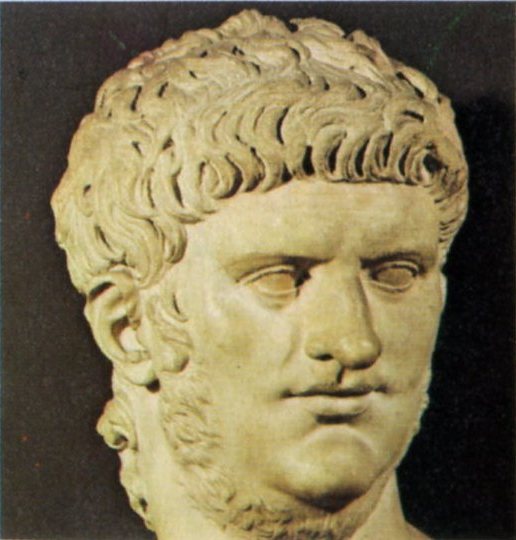
Anyway, discontent soon rose to the boiling point. Things were particularly bad in Britain, which had not yet settled into the docility Rome liked to see. In 59 Praesutagus, Rome's client king of the Iceni tribe (in East Anglia), died and left a will that divided his land: half of it went to his two daughters, and the other half went to Nero. He thought that by buying off Nero he could avoid the total confiscation of his estate, but the Roman governor grabbed all the Iceni land anyway. When Praesutagus' widow, Queen Boudicca (also spelled Boadicea) objected, the Romans stripped and flogged her and raped her daughters.
This outrage prompted a national uprising, in which Boudicca took charge of nearly all British tribes. Classical historians describe her as an imposing figure, a furious six-foot-tall redhead in armor. In 61 she led an estimated horde of 100,000 Celts to destroy Londinium, Verulamium (St. Albans), and Camulodunum; Tacitus later reported that 70,000 Romans and their sympathizers were killed in the sieges and the brutal massacres that followed.
The Roman governor came back from a successful campaign in north Wales to find most of Britain in arms against him. The legion at Lindum had already been badly cut up, and for some reason the one at Isca refused to move (later its commander killed himself to avoid facing a trial for this). The governor took the other two legions into the Midlands, and there Boudicca came to grief, perhaps because fellow queen Cartimandua remained loyal to the Romans. In the resulting battle, the Britons outnumbered the Romans four to one, but again Roman discipline won the day. Boudicca and her daughters took poison to escape further dishonor at Roman hands, the entire Iceni tribe was enslaved, and famine swept the land because the war had interrupted farming. However, in the investigation that followed the rebellion, Rome realized that the British grievances were genuine, so future governors went more easy on the natives. Ironically, this leniency Romanized the Britons faster than the previous harsh policy.
The British rebellion was enough trouble for any emperor, but soon news arrived of a more serious Jewish revolt in Judaea, and of a major earthquake in southern Italy. This brought the old Etruscan streak in the Roman character to the forefront; always more superstitious than religious, the Romans could stand a wicked Caesar, but not an ill-omened one. In 67 Gaul, Spain and North Africa rose against Nero; none of these revolts spread beyond the province it started in, but the rebels started to agree that Servius Sulpicius Galba, the governor of Spain, would make a better emperor, and that could not be good for Nero.
Nero had a newly raised legion in Italy, but could not interest either it or the Praetorians in his survival. He discovered this when he considered fleeing from Rome to an eastern province that was still loyal, and the officers around him, instead of obeying his commands, mocked him by quoting a line from the Aeneid: "Is it so dreadful a thing then to die?" Next, Nero thought about taking refuge with the Parthians, throwing himself upon the mercy of Galba, or begging the people to spare his life and forgive his previous crimes. Unable to make up his mind on which option was best, he tried sleeping on it, woke up in the middle of the night, and found no guards or servants in the palace. This desertion could not mean anything good for Nero, so he fled from the Golden House to a villa outside Rome; the Senate declared him a public enemy and sentenced him to death in absentia. When he heard horses outside his hiding place, meaning that armed men from the Senate had come for him, he enlisted a secretary, whose hands were steadier than his, to help him stab himself in the throat. A performer to the end, his last words were, "What an artist the world is losing!"
68 to 96
The dynasty of Julius Caesar ended with Nero's suicide. Because there was no formula for choosing a head of state under these circumstances, four leaders from the provinces now rapidly rose to the throne, and three of them fell just as fast. Thus, we sometimes call 69 A.D. "the year of four emperors."
The first of these emperors, Galba, marched to Rome after he heard that Nero was dead. He was around seventy years old; his conservative attitude made him a living symbol of what the Republic used to be like, and his strict frugality contrasted strongly with Nero's loose spending. It contrasted too much, in fact, because the Praetorians decided he was too stingy. So did the legions on the Rhine, which revolted and declared Vitellius, the general Galba had just appointed to command them, as their emperor. After Galba ruled for seven months (June 68-January 69) the Praetorians murdered him and handed the office to Otho, governor of Lusitania (Portugal). Otho in turn ruled for just three months (January-April 69), because the Rhine legions refused to stand down, though their opponent was gone. They marched on Rome, and the forces Otho scraped up in Italy were no match for them; after he was defeated, Otho committed suicide. Vitellius ruled until December 69, and has been called a glutton who ate Rome out of house and home.
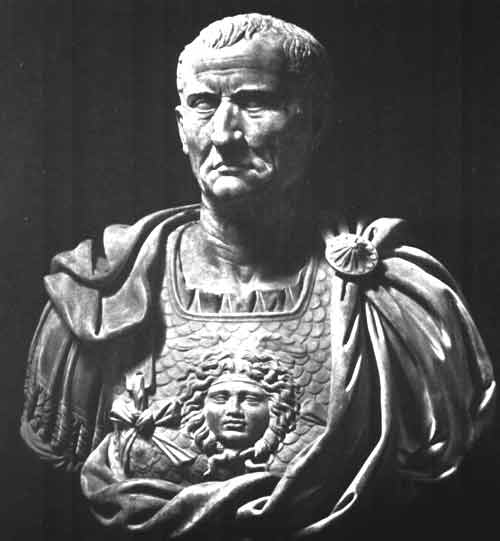 |
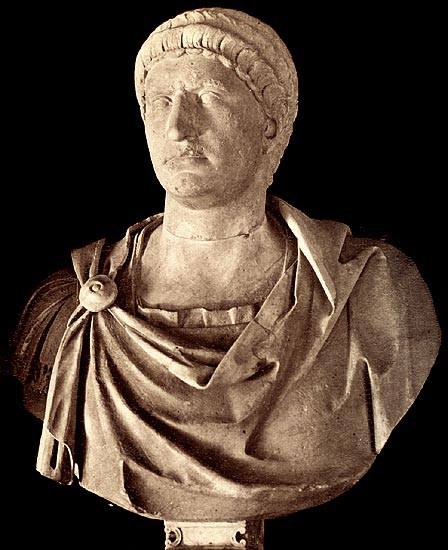 |
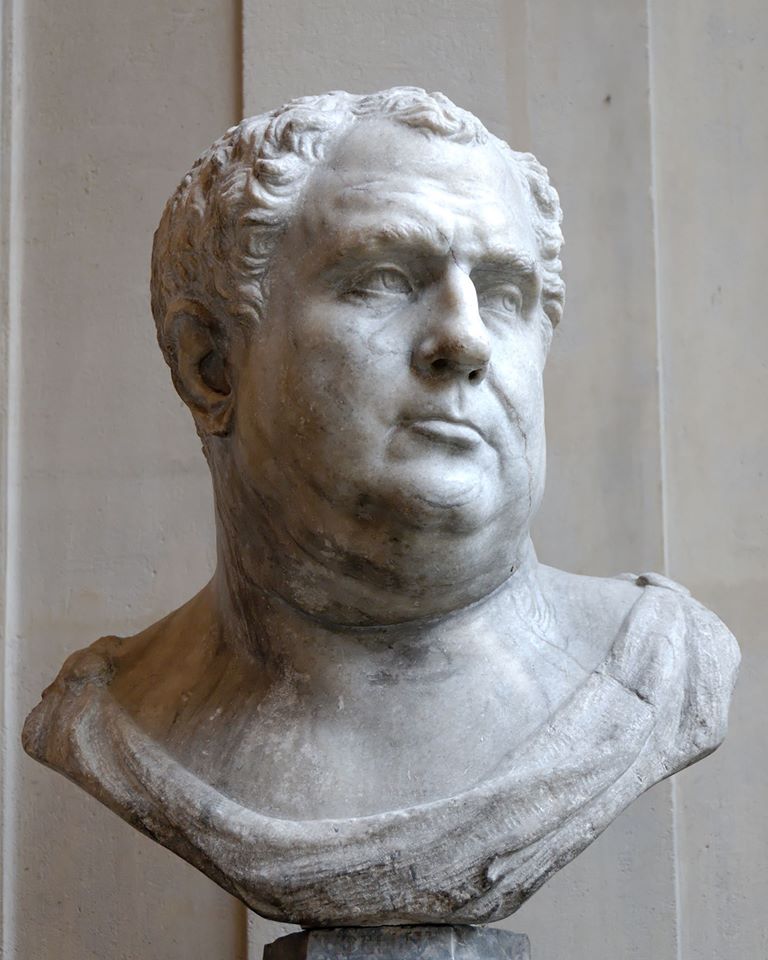 |
| Galba. | Otho. | Vitellius. |
When the legions fighting the Jews in the Holy Land found out that anyone with enough soldiers could be an emperor, they nominated their own commander, Vespasian. As Tacitus reported: "One day, as Vespasian emerged from his bedchamber, a few soldiers standing by in the usual formation . . . saluted him as emperor; then others ran up, calling him Caesar and Augustus and heaping on him all the titles of the principate. [Soon] all Syria had sworn the same allegiance . . . All the provinces washed by the sea as far as Asia . . . and all the territory extending inland to Pontus and Armenia, took the oath." Vespasian seized control of Egypt, diverting Rome's grain supply to him, and won the support of the legions on the Danube, which marched on Rome and killed Vitellius. Then he left his son Titus with the task of grinding down the Jewish rebellion, and proceeded to Rome, where he asked that his imperial authority be officially confirmed by the Senate.
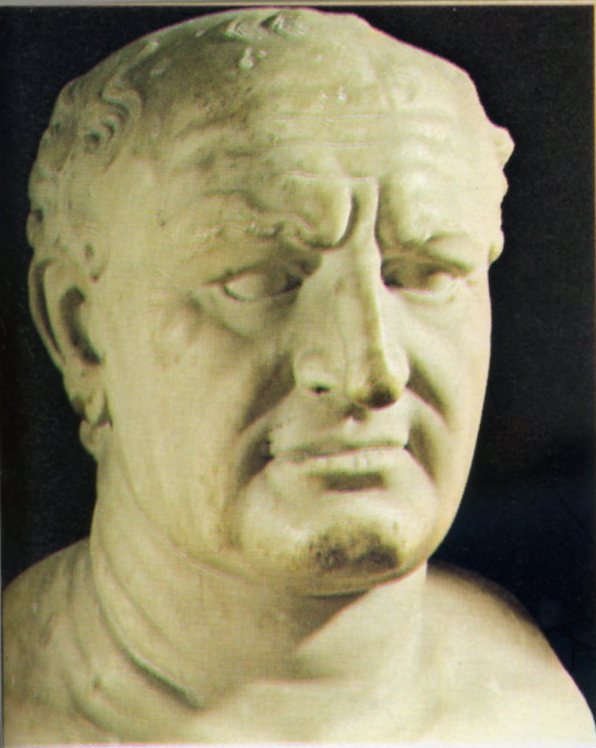
Vespasian, like Augustus, recognized that a good ruler will give the illusion that someone else holds the power. The Senate was glad to approve of his takeover, since it meant an end to a year and a half of chaos. For the next twenty-seven years the Flavian dynasty (Vespasian followed by his two sons, Titus and Domitian) gave the Empire professional, if autocratic, rule. The fiction of republican institutions gave way to a scarcely veiled monarchy as the Flavians openly treated the office of emperor as theirs by right of conquest and inheritance. Vespasian, however, ruled wisely, so nobody minded the loss of rights during his decade of rule (69-79). He gave Latin status to cities throughout Spain, and citizenship to all non-Romans who served in the army. To strengthen control of backwoods areas, he settled colonies of veterans and built roads and forts in them. On the eastern frontier, Emesa, Commagene and Lesser Armenia were annexed. The legions in Britain resumed their advance, conquering Wales in 78 and northern England and southern Scotland in 84; the legion at Lindum moved its camp to Eburacum (York).(14) At home Vespasian sought to fill the bankrupt treasury by cutting expenses and introducing new taxes, but he was always careful not to put too much stress on the economy.
Finally, Vespasian was known for a dry sense of humor. One of his new taxes was on the public urinals, since urine was used for fulling cloth. When Titus complained about the new tax, Vespasian handed him a coin which came from the first day's proceeds, and asked, "Does it smell bad?" Titus admitted that it did not, and Vespasian replied, "Yet it comes from urine." His last words recalled the belief that emperors became gods when they died: "Dear me! I think I am turning into a god."
Vespasian was followed by forty-year-old Titus. Rome loved him, and he loved them; Tacitus called Titus "the delight and darling of the human race." He presided over the completion of the Colosseum, which Vespasian had built on the site of Nero's giant statue (hence the name). What a grand opening the Colosseum had! The whole city of Rome basically took a holiday and celebrated at the Colosseum; over a period of a hundred days, 9,000 animals and a lot of gladiators (see below) were slaughtered. And if you think that was a party that had gotten out of hand, Titus topped it off by commissioning two naumachia, re-enactments of naval battles. For these, the Colosseum was flooded, war galleys were floated inside it, and armed men on the galleys fought to the death. Whereas a fight between gladiators did not have to end with death, the naumachia were as bloody as real naval battles (e.g., the First Punic War) must have been.
The other major event that happened under Titus was the eruption of Mt. Vesuvius (see footnote #21). However, he fell ill and died after only two years (81), and his brother Domitian (81-96) took his place.
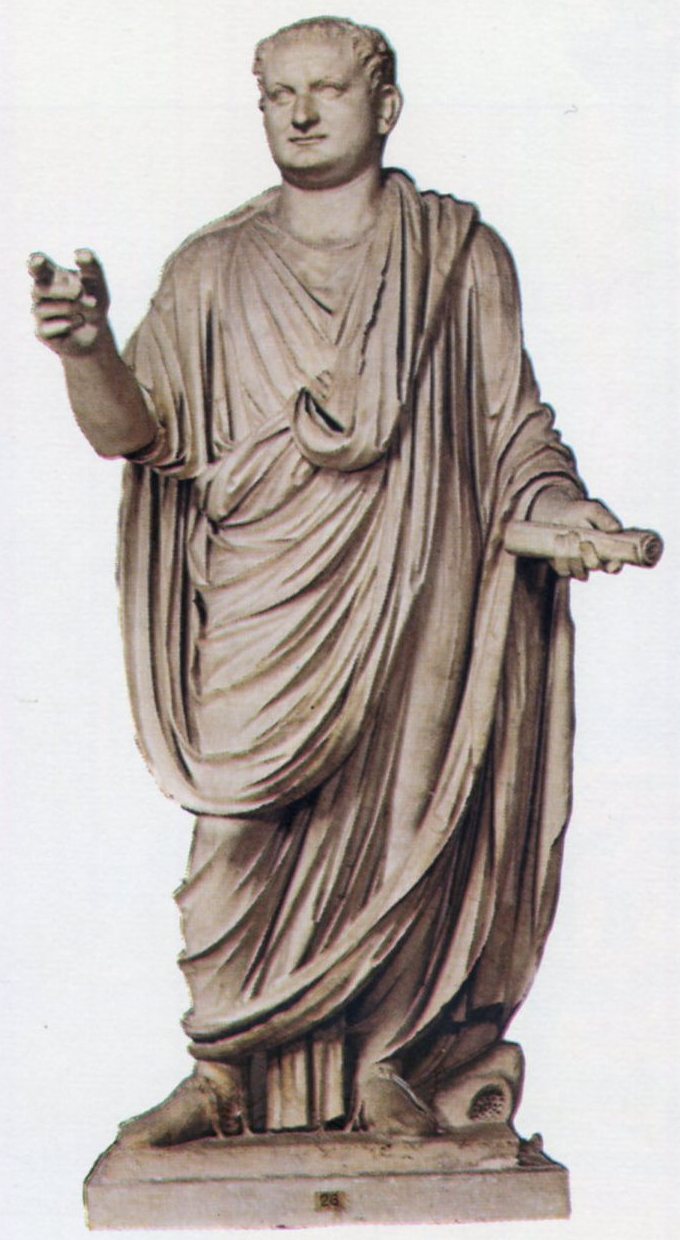
People didn't expect Domitian to become an emperor. Most thought Titus would live long enough to have a son that would be a suitable heir. Vespasian tended to neglect Domitian, concentrating his attention on Titus, but never giving Domitian any position of authority. While Titus was emperor, he granted his younger brother some honors, but if he was planning to make Domitian a partner in matters of leadership, he never got around to doing it. As a result, Domitian wasn't trained for the position he would someday hold. In his defense, he did try to rule responsibly, at least during the 80s, so while most history texts declare that his whole reign was bad news, he was better than Caligula or Nero.
At first, Domitian proved himself an efficient administrator, to the point of being a micromanager. He raised and lowered the value of the currency, depending on the state of the economy and how much the government was spending. The city of Rome had been heavily damaged by a fire in 80, so Domitian launched a construction program that built, completed or restored at least fifty public buildings, including a new palace. To have control over Roman conduct and morals, which mainly meant fighting corruption and promoting the traditional religion, he gave himself the title of censor perpetuus, censor for life. Finally, he won the support of the soldiers by giving them the first pay raise they had received since the time of Augustus.
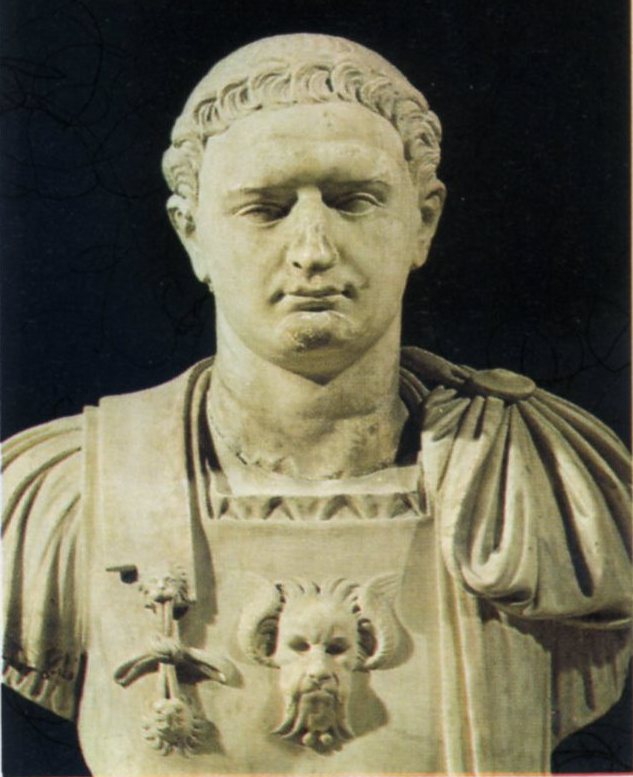
Domitian's greatest desire was to become a conquering hero. He spent much of his reign outside of Rome, wandering in the provinces bordering on the Rhine and Danube Rivers, looking for an excuse to make war on the barbarians. For that reason, in 83 he annexed the rest of the land between the Rhine and Danube; this shortened the frontier and allowed him to give himself the title Germanicus. Then in 85 he got the opportunity he had been seeking. The kingdom of Dacia, in modern-day Romania, revived itself (see Chapter 3, footnote #50); its king, Decebalus, made it a formidable power, crossed the Danube and slew the governor of Moesia. Domitian marched to the front, but had to return to Rome the following year. After he left, the army suffered a bad defeat before it prevailed against the Dacians in 88. Then the upper Danube became a trouble spot as two German tribes (the Marcomanni and Quadi) and a Sarmatian tribe (the Iazygians) probed the Empire's defenses. Domitian won in the end, as in Dacia, but these troubles were a warning of the crises the Germans would cause in the next century.
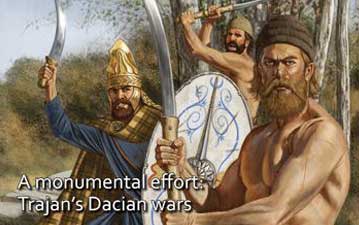
Because he never got along with the Senate, all the Roman authors who had anything to say about Domitian were hostile. Juvenal called him a "bald Nero," while Suetonius claimed he was a sadist whose favorite pastime was impaling flies on a stylus. As time went on, revolts and plots against Domitian caused the paranoia he already suffered from to increase, so by the time the decade of the 90s arrived, he had the Romans living in both fear and peace. He executed many suspected opponents in the army and Senate; the Apostle John was exiled to the Aegean island of Patmos during his reign, because Domitian viewed it as a crime to not worship the emperor as a god. His network of informers became the terror of Rome, and were so thorough, it was said, that men forgot the use of their tongues. It was even said that he had the marble walls and floors of the palace cleaned so well that they shone, so he could see the reflection of someone sneaking up on him.
Maybe other people weren't out to get Domitian previously, but his behavior made sure they would do him in later. Suetonius tells us his fears were fulfilled when an astrologer predicted Domitian would die around noon, on September 18, 96. Of course Domitian was more fearful than usual as this date and time approached; he was also spooked by a dream which told him that Minerva, his favorite goddess, would no longer protect him. In fact there was a plot to kill him on that day, and when the day arrived, Domitian frequently asked what time it was, until a boy in the palace told him it was past noon; Domitian was relieved when he heard that, thinking the astrologer had been wrong. Actually, the boy was in on the plot and lied; the time was really noon and seven men with swords, led by a household servant, stabbed Domitian. After his death, the Senate removed Domitian's name from all public places and refused to give him a state burial.
The Antonines: "Five Good Emperors"
96 to 180
Domitian, like Caligula, Nero and Titus, died without leaving an heir, so at this point there easily could have been another civil war. It was avoided because the Senate, which never cared for the idea of hereditary succession, immediately chose a respectable old aristocrat named Nerva (96-98), to be the next emperor. Because Nerva was the type who didn't want to make waves (he only accepted the job as emperor because he felt it was his duty to restore peace after Domitian's death), and because he had no children, the Senate felt it could now run the show, regaining some of the power it had in the days of the Republic. A year later, when the army started acting up, Nerva placated them by adopting Trajan, a popular general from Spain, as his successor. Aside from that, all Nerva could do was experiment with lowering taxes, before he fell ill and died. Nevertheless, he set a new precedent, by adopting his successor instead of giving the honor to a relative. This is why we now call Nerva one of "the five good emperors," though he accomplished less than the others.
Trajan (98-117) was the first emperor who was not born in Italy. Following Nerva's example, Trajan in turn adopted his nephew Hadrian (117-138), Hadrian adopted Antoninus Pius (138-161), and Antoninus Pius adopted Lucius Verus (161-169) and Marcus Aurelius (161-180).
This series of adoptions occurred because only the last of these emperors had a biological son to succeed him. But because the adopted heirs were all picked for merit, they were very capable rulers. And while Nerva, Trajan, and Hadrian each adopted their heirs less than a year before their deaths, Hadrian improved the system by ordering Antoninus to adopt his heirs immediately, while Hadrian was alive. This gave Lucius and Marcus a long apprenticeship before they took the place of Antoninus. By accident the Empire had found an excellent way to choose its rulers; better than simple heredity, as Marcus' son, Commodus, quickly proved when he came to the throne.
Because Trajan came from a colonial family, he knew that in provincial cities the local officials had a free hand to manage things as they pleased, which they usually used for their enrichment. Trajan tightened the reins on this behavior by sending Roman officials, called curators, to supervise the municipalities. More surprisingly, the rough soldier-emperor started a massive public assistance program for the poor. He set aside the equivalent of a year's imperial budget, and used it to make low-interest (5%) farm loans; the interest from these loans went to support orphans and children from poor families.
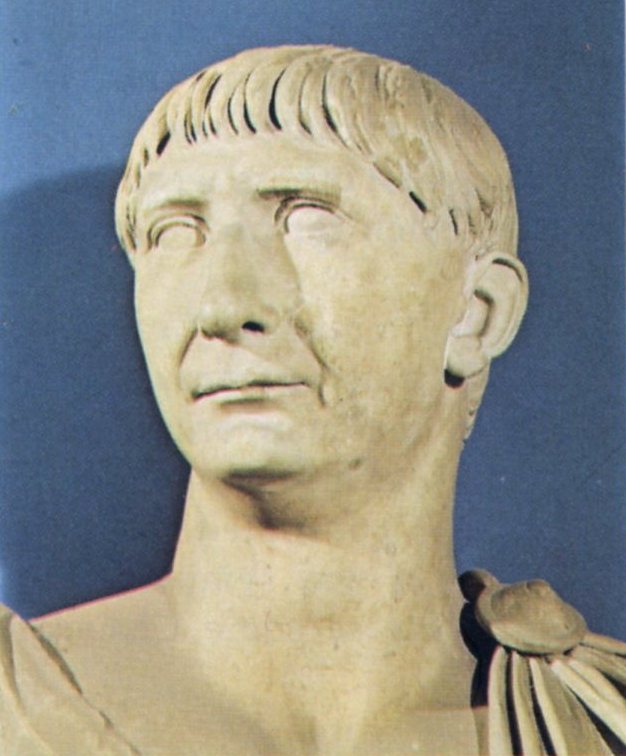
During this period Rome's three main enemies---the Germans, Dacians and Parthians---caused trouble, but the Roman army always had the situation under control. At first the Dacians were the biggest menace, because after the war with Domitian, they could still fight back. In fact, Decebalus was acting hostile when Trajan became emperor, and Trajan first had to go to Rome to make sure everyone accepted his rise to the throne, and that the proper ceremonies had been conducted to deify Nerva for the good things he had done. It took ten legions, two campaigns, the construction of a bridge across the Danube (at two-thirds of a mile, it was the longest bridge the Romans ever built), and the personal leadership of Trajan to enforce Roman authority over the whole Balkan peninsula. Trajan annexed Dacia (modern Romania) in 106, creating Rome's only trans-Danubian province. Because Dacia was rich in gold and silver, he brought back so much gold from that campaign that he actually lowered taxes, even while embarking on an ambitious building program. Today in Rome you can still see one of the projects from that program, Trajan's Forum. Also in 106, Trajan annexed the Nabataean kingdom, (modern Jordan and the Sinai peninsula), turning it into the province of Arabia. These successes inspired a new proverb; henceforth whenever they got a new emperor, they hoped, "May he be luckier than Augustus, and better than Trajan."
Parthia, the archenemy of Rome, was next on Trajan's list, and he would have conquered Parthia had he lived longer. Here the casus belli was Armenia. The treaty Rome and Parthia had signed in 66 stated that the king of Parthia could choose who would be king of Armenia, but that appointment had to be ratified by Rome, and this time the Parthian king insisted on crowning his nephew, which the Romans found unacceptable. A quick campaign conquered Armenia in 114, and Trajan decided to keep it, instead of picking another client king to rule it. Then, because the Parthians were quarreling over who should rule over themselves, Trajan continued eastward, conquering all of Mesopotamia, including Ctesiphon, the Parthian capital, in 115. He got as far as the shore of the Persian Gulf, where he commented that he wished he could march all the way from there to India, as Alexander had done. But Armenia and Iraq had been conquered too easily, and the Parthians were now encouraging revolts in those territories; furthermore, a wave of Jewish revolts in the provinces around the eastern Mediterranean now threatened Trajan's supply lines. Trajan decided it was time to return to Rome, suffered a stroke on the way back, and died in Cilicia (117). The next emperor, Hadrian, had so much trouble holding on to Iraq that he ended the war and gave back everything gained in the most distant Roman campaign, except for the city of Edessa. He thought the empire was big enough, most of the emperors after him agreed, and the imperial frontiers re-stabilized where Augustus had them, on the Rhine, Danube and Euphrates.(15)
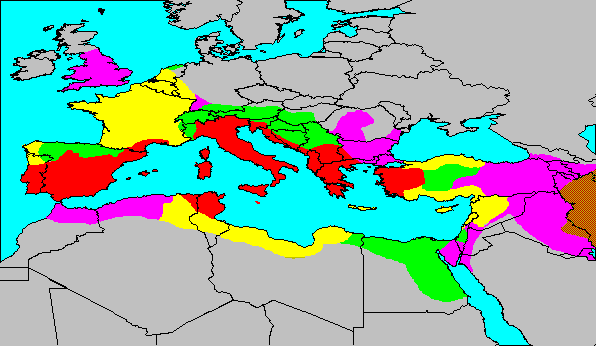
Though Hadrian is on our list of good emperors, he was remarkably different from Trajan. Indeed, the third century historian Cassius Dio reported that Trajan's wife, Plotina, had chosen Hadrian to succeed Trajan when the elder emperor was on his deathbed. Like Trajan, Hadrian had a military background--he spent enough time in the army for the soldiers to see him as one of them--but he did not believe the Empire could always conquer or destroy its enemies, hence his decision to abandon several of Trajan's conquests. Another oddity was that Hadrian did not like Rome very much. Halfway through his reign, he built a fancy villa for himself at Tivoli, seventeen miles east of Rome, and after he moved in he only went to Rome when he had to be there. His real passion was Greek culture, all aspects of it.(16) One sign of it is visible in his statues; he was the first emperor since Nero to grow a beard, and because he was a more successful ruler, he made beards fashionable in Rome.
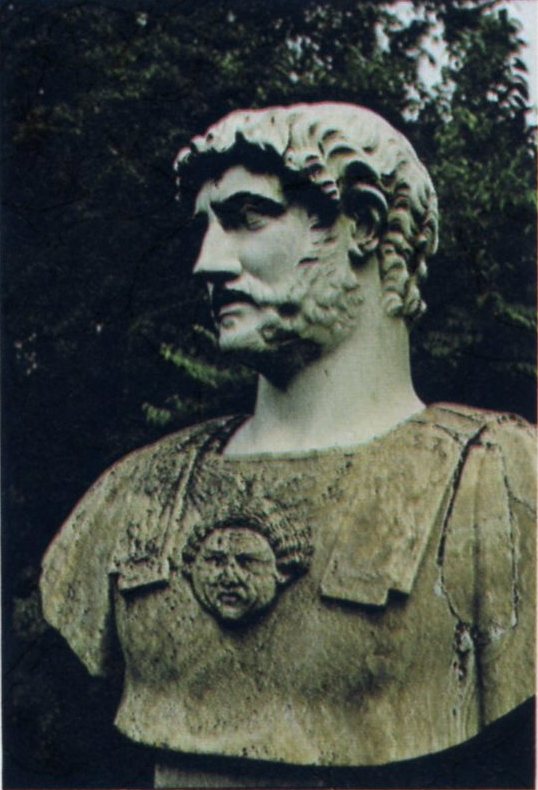
Finally, Hadrian differed from his predecessors because he thought the other provinces were just as important as Italy. In the decade of the 120s, he traveled extensively, inspecting almost every province of the Empire. New towns were built, old ones restored, and many public works were constructed, among them the famous Pantheon in Rome. Altogether Hadrian spent more than half of his reign away from Rome, and visited more provinces and cities than any emperor before him--or afterwards. In that sense, you could say he was not a Roman emperor so much as a roaming emperor (pun intended--sorry).
All that traveling was necessary because of Hadrian's attention to detail; he felt he had to see the provinces for himself before making any important decision concerning them. He also attempted to ease the heavy tax burden on the provinces, and standardized Roman law, making legal procedures the same throughout the Empire. The attention Hadrian gave to the provinces meant that life got better for the typical resident of the provinces. The only province where Hadrian failed was Judea, because his actions there ended up causing a rebellion. The Roman world now became a genuine commonwealth, rather than one strong government ruling over many weaker dominions. A generation later, Greek writers would sincerely say that "an attack on Rome is an attack on us."
Of all the "five good emperors," we know the least about Antoninus Pius, because nothing bad happened during his reign, and no news is good news.(17) Scattered revolts did break out in places like northern Britain, Judea, Dacia and Egypt, but the local generals always had the situation under control, so the emperor did not need to lead the legions. Indeed, Antoninus was the opposite of Hadrian in the sense that while he was emperor, he never left Rome for more than a day. In domestic affairs, he ran the imperial and provincial governments so frugally that his reign ended with 2.7 billion sestertii in the imperial treasury.
Antoninus was succeeded by two co-emperors, Lucius Verus and Marcus Aurelius. Marcus Aurelius was the closest to Plato's ideal of the "philosopher king" that Western civilization ever produced. Before he grew up, Marcus accepted the Stoic philosophy, so as an adult, he followed a disciplined lifestyle. Though he preferred the quiet contemplation of his books to the blood and brutality of the battlefield, his reign saw invasions by the Parthians from the east and by German tribes from the north. To deal with these menaces, he put Lucius in charge of the Parthian war and gave himself military training to lead the legions in Europe against the Germans. However, he did not have enough troops to go on the offensive until Lucius came back, and by then, raiders were striking across the Rhine, the Alps and the Danube, threatening every province on the other side; one group even besieged Aquilea, the main city in northeast Italy. Then when the soldiers sent to Asia returned in 166, they brought with them a mysterious disease, most likely smallpox or measles, and spread it through the Empire.(18) Only recently have we appreciated the effect epidemics have had on history. We estimate that between one-fourth and one-third of the Empire's urban population was wiped out by plagues between 180 and 250; even Galen, the famous doctor, thought it wiser to flee to the countryside than stay and tend for the sick. We also believe that this epidemic eventually killed both Verus and Marcus.
Marcus was finally ready to march against the barbarians in 168. His opponents included the Marcomanni, the Quadi, the Lombards (who first appear in history at this point), several other German tribes, and the non-German Iazygians. Seeing this as the most serious threat to the Empire in more than 200 years, the emperor fought them for the rest of his reign, moving from camp to camp and personally leading battles. While engaged in these campaigns, Marcus wrote his Meditations, a collection of personal thoughts notable for its lofty Stoic idealism and love of humanity, which has won new admirers in every generation.(19)
And that wasn't all. Because legions had been transferred to the Danube front, the western provinces were left vulnerable. This encouraged the Mauri, some Berber tribes from North Africa, to raid Spain in 171, and there were minor anti-Roman uprisings in Britain. In 175, Avidius Cassius, the best general in the east and the current governor of Syria, made a bid to become emperor when he heard Marcus Aurelius was already dead. This rebellion was much more threatening than the British revolts, but it fell apart when the rebels learned that the emperor was in fact alive and coming to get them.
Between 68 and 180, eight legions were raised (three in the turmoil following Nero's death, one by Domitian, two by Trajan and two by Marcus Aurelius) and six were lost (two in the revolt of the Rhine legions that put Vitellius on the throne, two in Domitian's Dacian war, one in a Scottish war under Hadrian and one in the revolt of Simeon Bar-Kochba, a Jewish leader who claimed to be the Messiah). Yet while the total number of legions increased only slightly--from twenty-eight to thirty--most of them gradually shifted eastward. To provide reinforcements for his Parthian war, Nero moved one legion from Spain and one from Dalmatia; they stayed in the east afterwards. Asia Minor's defense required another two legions and the Danube required four more; to get these troops the emperors transferred three legions from the Rhine, one each from Britain and Egypt, and the one raised in Italy during Nero's last days. The two Marcus raised for his war against the Marcomanni remained on the upper Danube after the fighting ended.
The defense of the Empire under Marcus Aurelius was successful, but the wars, combined with the epidemic mentioned above, put a severe strain on the treasury and civilian population. For military duty, Marcus recruited prisoners, gladiators, and just about anyone else who could wield a sword, causing a manpower shortage; some border provinces began to hire barbarians to help in farm work. The result was that barbarian settlements began to appear on the Roman side of the frontier. Eventually he decided that he needed to move the frontier from the Danube to the Carpathian mts., so he was planning a campaign to conquer Bohemia when he died at his post in Vindobona (modern Vienna). At Rome his equestrian statue still stands on the Capitoline Hill, "returning the salute of legions which have been dead for two thousand years."
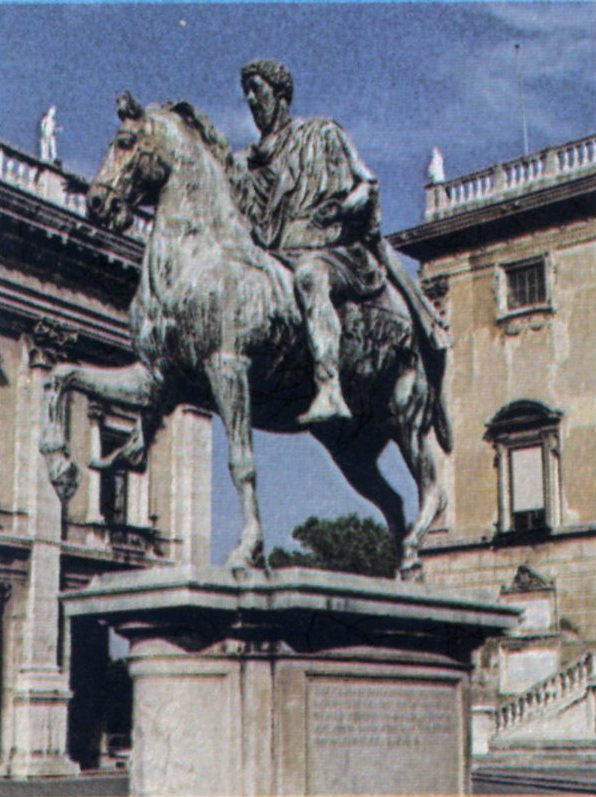
Marcus Aurelius may have been a fine soldier and philosopher, but he made two serious mistakes. First, he spent too much on both the military and on the needs of the people, meaning that he frittered away the surplus accumulated by his predecessor. Second, as noted above, he chose his son Commodus as his heir, ending the practice of adopting a talented successor, after it had worked so well for nearly a century. This left the Empire ill-prepared for some of its most severe tests, which came next. "Our history now plunges," wrote Cassius Dio, "from a kingdom of gold to one of iron and rust."
The Roman Achievement
The Roman Empire was run for the glory and profit of Rome. Roman aristocrats governed the provinces and made their fortunes doing so. Roman merchants and moneylenders monopolized the trade of the Mediterranean basin and became millionaires. Even the working-class Roman benefitted: Egypt and Africa sent him his daily bread, while gladiators and wild beasts from the borders of the Empire kept him entertained. Rome was a predator and the world was its prey.
Softening this harsh truth was the idea that it was Rome's duty to civilize the world. More than anything else the Romans believed in law and order. They always saw civilization and the city as superior to barbarism and the tribal community. Of course these ideas had come from Greece, and the civilizing mission of the Roman Empire was no different from that of Alexander the Great. What the Romans could claim was that they did it better. A famous passage from Virgil's Aeneid put this to verse:
"The Greeks shape bronze statues so real they seem to breathe,
And carve cold marble until it almost comes to life.
The Greeks compose great orations, and measure
The heavens so well they can predict the rising of the stars.
But you, Romans, remember your great arts;
To govern the peoples with authority,
To establish peace under the rule of law,
To conquer the mighty, and show them mercy once they are conquered."(20)
They did a better job because their soldiers were better. In the 300 years from 50 B.C. to 250 A.D., no barbarian could do more than prick the outer defenses of the empire. While there were occasional revolts, they never spread beyond the province where they started, and like the barbarian mischief, always occurred near the frontier. For the vast majority of Rome's subjects, this was the Pax Romana, a time of peace longer and more enduring than any seen since. It was also a time of security, for the Empire maintained a huge army of nearly a third of a million men, when none of its enemies could muster more than a tenth of that number. The Roman army did not even have to alter its organization; of the twenty-five legions that served Caesar Augustus, nineteen were still in existence two hundred years later, and nearly all of them had been in the same camp for 100 years or more. In fact, nine legions never changed their campsite at all! Because no army changes its organization until it has to, there's something to be said for an army so good that it didn't have to make any changes for three centuries.
With the frontiers secure, Roman administrators were free to promote the urban life throughout the provinces. In the already civilized areas the cities grew in size and magnificence; in the tribal lands new cities were built and barbarians learned to act civilized. For them it might only be skin deep, but their children would grow up as literate citizens of a modern community. Gradually the new patchwork of city-states spread over the whole Empire.
Today there are 39 nations where the Roman Empire once ruled. To this huge area, the Romans brought two languages (Latin and Greek), an efficient network of roads, a universal system of laws, weights, measures and coinage, and most of all peace and prosperity. Even more impressive, they maintained it for ten generations, and did it at a time when they could send orders only as fast as a man could ride, and transport cargoes in oxcarts and barges. This was Western civilization's greatest political achievement; Europeans have been trying to match it since that time.
Was the high noon of the Roman Empire really a good time to live? Edward Gibbon never doubted that it was. In the eighteenth century he wrote: "If a man were called to fix the period in the history of the world during which the condition of the human race was most happy and prosperous, he would, without hesitation, name that which elapsed from the death of Domitian to the accession of Commodus." And we know that Trajan, Hadrian, and Marcus Aurelius were very popular, because during the long periods when they were away from Rome, nobody tried to take the throne from them. Yet there was a dark side to the Empire's success. First there was slavery, an institution seen as a necessary evil at best; more than half the urban population was bound by it. Second, not all provinces were treated equally. The Romans regarded Egypt as a country to plunder, rather than a province to administer, so under Roman rule the culture of the pharaohs perished. Another victim was Judea, because the Jews refused to become Romans and suffered for it. But elsewhere the Pax Romana worked, on a scale that no European state has matched in the ages since. Which makes it all the more astonishing that just seventy years after Marcus Aurelius, the Empire would experience plagues, barbarian raids, corruption, and economic downturns in a sequence that nearly brought the whole state crashing down.
Nowadays everyone considers civilization a good thing because civilized people live longer and better. Back then this wasn't so obvious; it is unlikely that Roman peasants lived any longer than barbarian peasants, and since the cities were breeding grounds for disease--even after the introduction of plumbing--the Roman city-dweller's life expectancy was also short. In fact, the Roman soldier was likely to outlive both barbarians and civilians (unless he came to a violent end), due to better medical care, a better diet, plenty of exercise, and sanitation in the military camps; the legionaire's life expectancy was in the 60s, compared with no better than the 40s for anyone else. The Empire might bring greater security and things like roads, commerce and aqueducts, but classical civilization is not really about anything tangible. What the thinkers of the day valued the most about civilization were the mental achievements it produced. Arts and sciences were not to be judged by their usefulness, they were valued because they set men apart from animals.
Just how many of the Empire's subjects could read and write is debatable. The amount of graffiti on Pompeii's buildings suggests a literacy rate of one quarter to a third of the population--about as high as it can get in a pre-industrial society.(21) Beyond Greece and Italy, and in the countryside, it must have been much lower. It is unlikely that in Africa or Britain more than a few percent of the population could read or write.(22)
So the Pax Romana had its limits. The most civilized areas (Italy, Greece and the cities along the Mediterranean coast) enjoyed a vigorous culture, the likes of which we would not see in Europe again until the Renaissance. On the other hand, for people outside those cities and provinces the empire offered little more than law and order, and it was a system that favored the rich.
Economic Prosperity
Rome's unification of the ancient world had extensive economic consequences. The Pax Romana was responsible for the elimination of tolls and other artificial barriers, the suppression of piracy and brigandage, and the establishment of a reliable coinage. Such factors, in addition to the long peace, explain in large measure the great expansion of commerce that occurred in the first and second centuries A.D. Industry was also stimulated, but its expansion was hindered since wealth remained concentrated and no mass market for industrial goods arose.
Rome's offical port was at Ostia, located where the Tiber met the sea, but the Tiber was not a good river for navigation or commerce. The river's strong current made it difficult to go upstream, and dangerous floods were a common occurrence. Merchant ships with cargo and passegers headed for Rome often dropped them off at Puteoli, a port 150 miles to the south, and they traveled by road the rest of the way, because this was more convenient than landing at Ostia and fighting the Tiber's current. The Apostle Paul went this way, on his famous journey to Rome (Acts 28:13).
The economy of the Empire remained agrarian, and the huge estates prospered. On these tracts, usually belonging to absentee owners, many coloni, free tenants, tilled the soil as sharecroppers. The coloni replaced slave labor, which was becoming increasingly hard to find with the disappearance of prisoners of war.
One way to measure the prosperity of the Roman Empire is by the increase in philanthropy, both public and private, during the first and second centuries. For many this became a matter of civic pride. Pliny the Younger, for example, found out that the children in his native town of Como had to go to school in Milan because Como had no teacher for them, so he put up a third of the cost of hiring a teacher (Como's townsmen raised the rest), built a library for Como and paid for its upkeep, and gave 30,000 sestertii each year to support Como's lower-class children.
Speaking of money, here are some short lists of the currency denominations Rome used during the imperial period, and their relationship to one another. The amount of gold is given so you can calculate what their present-day value would be. For example, on the day this was written, the price of gold was $1,242 an ounce, so in the time of Caesar Augustus an aureus would be worth $496.80 in today's dollars, a denarius would be worth $19.87, a sestertius would be worth $4.97, and an as would be worth $1.24.
27 BC-212 AD:
1 gold aureus (0.4 ounces of gold, devalued to 0.32 ounces by 212)
= 25 silver denarii
= 100 bronze sestertii
= 400 copper asses
294-312:
1 gold aureus solidus (0.267 ounces of gold)
= 10 silver argentei
= 40 bronze folles
= 1,000 debased metal denarii
312 onwards:
1 gold solidus (0.22 ounces of gold)
= 24 silver siliquae
= 180 bronze folles
Late in the first century A.D. the first signs of economic stagnation appeared in Italy. Italian agriculture lost much of its market because Gaul, Spain and North Africa were now producing their own wine and olive oil. To aid the Italian wine producers, Emperor Domitian created an artificial shortage, by forbidding new vineyards in Italy and by ordering half the existing vineyards in the provinces to be plowed under. This, and the failure of city governments to balance their budgets, foreshadowed the economic crisis of the third century A.D., when political anarchy and monetary inflation caused the economy of the Empire to collapse.
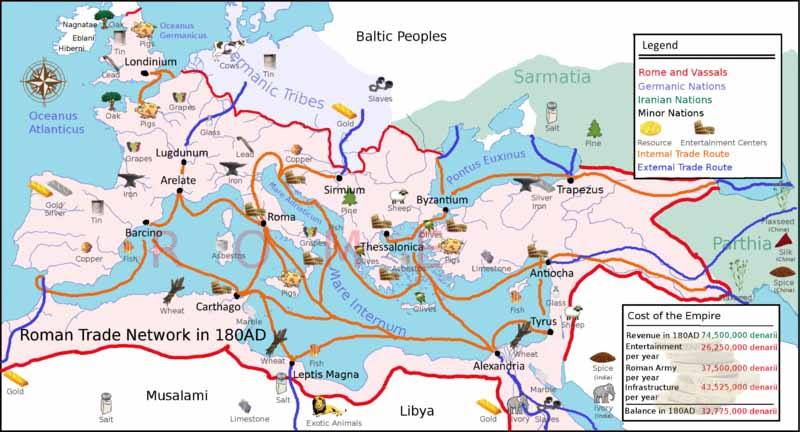
A simple economic map of the Roman Empire, showing resources and trade routes.
Rome, Imperial Capital
At the hub of the sprawling Empire was Rome, with about a million inhabitants at its peak. Despite the extensive building projects of the emperors, Rome presented a great contrast of magnificence and tawdriness, of splendid public buildings and squalid tenements, which often collapsed or caught fire. The crowded narrow streets, lined with apartment houses and swarming with all manner of people, are described by the satirist Juvenal early in the second century A.D.:
"Hurry as I may, I am blocked
By a surging crowd in front, while a vast mass
Of people crushes onto me from behind.
One with his elbow punches me, another
With a hard litter-pole; one bangs a beam
Against my head, a wine-cask someone else.
With mud my legs are plastered; from all sides
Huge feet trample upon me, and a soldier's
Hobnails are firmly planted on my toes."(23)
At the top of the social order were the old senatorial families, who lived as absentee owners of huge estates and left commerce and finance to a large and wealthy middle class. In contrast to the apartments of the poor, the homes of the rich were palatial, as revealed by excavations at Pompeii. These elaborate villas contained courts and gardens with fountains, rooms furnished with marble walls, mosaics on the floors, and many frescoes and other works of art. An interesting feature of Roman furniture was the use of couches instead of chairs. People usually reclined, even at meals--a custom which must have come in handy during the legendary feasts served by the wealthy.
The lower classes in the cities found a refuge from the dullness of their existence in social clubs, or guilds, called collegia, each comprising the workers of one trade. The activity of the collegia did not center on economic aims, like modern trade unions, but on the worship of a god and on feasts, celebrations, and decent burials for members.
For slaves, living conditions varied greatly. Those in domestic service were often treated humanely, and their years of efficient service frequently rewarded by emancipation. Nor was it uncommon for freed slaves to succeed in business, letters, and the imperial service. On the other hand, conditions among slaves on the large estates could be extremely harsh. Beginning with Augustus, however, many laws protected slaves from mistreatment; Hadrian, for example, forbade private prisons, the killing of a slave without judicial approval, and the selling of slaves to gladiatorial farms.
Recreation played a key role in Roman social life. Both rich and poor were exceedingly fond of the public baths, which in the capital alone numbered 800 during the early days of the Empire. The baths served the same purpose as our modern-day athletic clubs. The larger baths contained enclosed gardens, promenades, gymnasiums, libraries, and famous works of art besides the sequence of rooms through which one moved; the sweat room, the warm room where sweat was scraped off by a slave (soap was unknown), the tepid room for cooling off, and the invigorating cold bath. Another popular room was the lavatory, with its long row of marble toilets equipped with comfortable arm rests. Here Romans liked to sit and chat for an hour or more.
Foot races, boxing, and wrestling were minor sports; chariot racing and gladiatorial contests were the chief amusements. The cry for "bread and circuses" reached such proportions that by the first century A.D. the Roman calendar had as many as a hundred days set aside as holidays, most of which had free games for the spectators. The most popular sport was chariot racing; in Rome these took place at the Circus Maximus, a huge marble-faced structure seating about 150,000 spectators. The games, which included as many as twenty-four races each day, were presided over by the emperor or his representative. The crowds bet furiously on their favorite charioteers, whose fame equaled that of the sports heroes of our own day. Charioteers were organized into four teams, each marked by the color they decorated themselves and their horses with: white, blue, red or green. Later, in the Byzantine era, political parties would form around two of these teams: blue stood for the conservatives, green for the liberals.
"Roman races, contests, and dramatic festivals were religious in origin, designed to appease the wrath or win the favor of the gods. Despite the howls of vast mobs urging on a winner, custom demanded decorum at the games. Eating and drinking were prohibited in the Circus Maximus.
On one occasion, Augustus reprimanded a Roman of some social standing for drinking wine. 'If I want refreshment,' the Emperor observed pointedly, 'I go home.'
To this the gentleman replied, 'Ah, Caesar, but if you go home, you're sure to find your seat when you return!'"(24)
If money is a measure of an athlete's talent (or at least how we value his talent), then the greatest charioteer of all must have been Gaius Appuleius Diocles, a second-century champion. In twenty-four years of racing, he won 35,863,120 sestertii in prizes, worth $15 billion in 2014 dollars. Remember that the next time you think today's professional athletes are paid too much. Dale Earnhart Jr., eat your heart out!
Scarcely less popular, but infinitely less civilized, were the famous gladiatorial contests. These cruel spectacles, which have no exact counterpart in any other civilization, were held in arenas, the largest and most famous of which was the Colosseum. The contests took various forms. Ferocious animals were pitted against armed combatants or occasionally even against unarmed men and women who had been condemned to death. Another type of contest was the fight to the death between gladiators, generally equipped with different types of weapons but matched on equal terms. Often the life of a defeated gladiator who had fought courageously would be spared at the request of the spectators.(25) Although many Romans decried these bloodlettings, they continued even after the Empire legalized Christianity (see Chapter 5, footnote #19).
Roman Engineering and Architecture
The Empire's needs required a communication system of paved roads and bridges, as well as huge public buildings and aqueducts. As road builders, the Romans outdid everyone else up to this point. Constructed of layers of stone and gravel according to sound engineering principles, the roads were planned for armies and messengers and kept in constant repair. Some, like the Appian Way, are still in use today.
In designing their bridges and aqueducts, the Romans placed a series of stone arches next to one another to provide mutual support. Sometimes they used several tiers of arches, one above the other. Fourteen aqueducts, stretching a total of 265 miles, supplied some fifty gallons of water daily for each inhabitant of Rome. Rome's superintendent of aqueducts proudly described them as "a signal testimony to the greatness of the Roman Empire," to be contrasted with "the idle pyramids or all the useless, though famous, works of the Greeks."(26)
Many scholars, especially Athenophile ones, assert that the Romans were mere students of the Greeks. This may be true in art and literature, but when it came to architecture, the Romans clearly surpassed their teachers. Greek temples, for instance, were more attractive than Egyptian ones, but the basic architectural elements--one or more small rooms in the middle, a symmetrical layout, and lots of columns--remained the same. This structural simplicity was too restrained for the Romans. By using concrete--a Roman invention--faced with brick or stone, they developed new methods for enclosing space. The Greeks' static post and lintel system was replaced by the more dynamic techniques of vaulting derived from the arch. Some earlier civilizations, like the Babylonians, Greeks and Etruscans, knew how to construct a true arch, but the Romans were the first to make full use of it; the Greeks preferred to put their arches underground to support buildings.
Heavy concrete barrel vaults, cross (or groin) vaults and domes--all so solid that they exerted no sidewise thrust--made possible the vast interiors that distinguish Roman architecture. The barrel vault was essentially a series of connected arches resembling a tunnel, and the cross vault consisted of two barrel vaults intersecting at right angles. The largest Roman domed structure is the Pantheon; as its name suggests, it was dedicated to "all the gods" by the emperor Hadrian, as a symbol of the union of Greeks and Romans on equal terms.
To construct the Pantheon, Hadrian first had to remove an older temple on the site. Marcus Agrippa built this temple in the time of Augustus, but it had burned down in the century since then. He gave it a Greek-style columned portico in the front, because all temples were expected to have that by now, and then behind that he put the main part of the building, a huge round chamber that is 142 feet wide and 142 feet high. The massive dome rests on thick round walls of poured concrete that could not be weakened by window openings. The only light enters through a great hole, twenty-nine feet wide, at the top of the dome. This dome was the largest in the world until 1880.
Roman buildings were built to last--the Pantheon stands intact today--and their size, grandeur, and decorative richness aptly symbolized the proud imperial spirit of Rome. Whereas the Greeks produced the classical temple, theater, and stadium, the Romans contributed the triumphal arch, bath, basilica, amphitheater, and the multi-storied apartment house.
Knowledge and Science in the Roman Empire
Unlike other peoples of the ancient world, the Romans were never very interested in knowledge for its own sake. The Phoenicians and Greeks, for instance, sent explorers into the Indian and Atlantic Oceans (Hanno, Pytheas and Eudoxus), but under the Romans exploration all but ceased. There was no Roman equivalent of Marco Polo to travel beyond the imperial frontier and tell us about the Africans, Indians, or the nomads of the Russian steppe; legions marched into Scotland, but the only thing that interested them about the Picts was how to kill them. If they needed specialized knowledge, like medicine, they preferred buying a slave who knew it over learning it themselves; consequently many physicians in Rome were Greek slaves. Nor was there much political or social discussion; political discussion would have looked like treason to the emperor, and social or economic discussion would have threatened the rich. As H. G. Wells put it, "The incuriousness of the Roman rich and the Roman rulers was more massive and monumental even than their architecture."(27)
The Romans had little scientific curiosity, but by putting the findings of Greek science to practical use, they excelled in engineering, applied medicine, and public health. An example of the latter was how they developed the extensive practice of hydrotherapy--the use of mineral baths for healing. Beginning in the early Empire, doctors were employed in infirmaries where soldiers, officials, and the poor could obtain free medical care. Great aqueducts and admirable drainage systems also show Roman concern for public health.
Characteristic of their utilitarian approach to science was the Romans' predilection for amassing immense encyclopedias. The most important of these was the Natural History compiled by Pliny the Elder (A.D. 23-79), an enthusiastic collector of all kinds of scientific odds and ends. In writing his massive work, Pliny is reputed to have read more than 2,000 books. The result is an intriguing mixture of fact and fable thrown together with scarcely any method of classification. Nevertheless, it was the most widely read work on science during the Empire and the early Middle Ages.
Pliny was well aware of the lack of creative scientific activity in his day. "In these glad times of peace," he wrote, "no addition whatever is being made to knowledge by means of original research, and in fact even the discoveries of our predecessors are not being thoroughly studied." To Pliny, the cause of this state of affairs was "blind engrossment with avarice," and he cited this example: "...now that every sea has been opened up . . . an immense multitude goes on voyages--but their object is profit not knowledge."(28)
The two greatest scientists of the Roman world were Greeks, Claudius Ptolemy and Galen, both of whom lived in the second century A.D. Ptolemy resided at Alexandria, where he became celebrated as a geographer, astronomer, and mathematician. His maps show fairly accurate knowledge of a broad section of the Old World, and he used an excellent projection system. But he exaggerated the size of Asia, an error that influenced Columbus to underestimate the width of the Atlantic and to set sail from Spain in search of Asia. His work on astronomy, usually called the Almagest ("the great work") from the title of the Arabic translation, summed up the geocentric, or earth-centered, view of the universe that prevailed until the sixteenth century. In mathematics, Ptolemy's work in improving and developing trigonometry became the basis for modern knowledge of the subject.
Galen, born in Pergamun in Asia Minor, was a physician for a school of gladiators. His fame spread, and he was called to Rome to become the physician of Marcus Aurelius. Galen was responsible for notable advances in physiology and anatomy; for example, he was the first to explain the mechanism of respiration. Forbidden by the Roman government to dissect human bodies, Galen experimented with animals and demonstrated that injuries to one side of the brain produce disorders in the opposite side of the body.
Galen's account of how he discovered the cause of a Roman matron's insomnia shows that he was aware of the psychosomatic factor in illness: he noted that the lady's pulse "suddenly became extremely irregular' whenever the name of a famous actor was mentioned. "Now what was it that escaped the notice of previous physicians when examining the aforesaid woman?" Galen wrote. "They have no clear conception of how the body tends to be affected by mental conditions."(29) Galen's medical encyclopedia, in which he summarized the medical knowledge of antiquity, remained the standard authority through the entire Middle Ages.
This is the End of Chapter 4.

FOOTNOTES

1. Augustus imitated Julius Caesar by renaming the sixth month of the year August, after himself, and stole a day from February to make his month as long as July; that is why February is the shortest month.
2. He wore platform shoes to disguise his short stature, and to keep away the cold, he covered his legs with wool strips and wore as many as four tunics under his toga.
3. The Spanish district was Galicia; the Alpine area was most of Switzerland, plus a zone running from Geneva to modern Monaco that would become the province of Alpes.
4. The Rhine and the Danube became the recognized frontiers of the Roman Empire in Europe, but the area around the North Sea was abandoned gradually. Only in 17 A.D. did Rome pull out of Germany's North Sea coast, and it held onto Holland until the time of Claudius.
5. Horace, Odes 3.6 (trans. James Michie), The Odes of Horace, Indianapolis, Bobbs-Merrill, 1965, pg. 138.
6. Actually, "Caligula" was a nickname he detested. When he was a boy, on the Rhine front with his father Germanicus, some Roman soldiers made him their mascot, gave him little army boots (caligae) to wear, and called him Caligula, meaning "Bootkins."
7. Suetonius devoted nineteen chapters of The Twelve Caesars to Caligula's good deeds, and forty-one to "Caligula the monster." Sorry, I forgot what the positive achievements were.
8. Herod Agrippa was the grandson of Herod the Great, the infamous king of Judaea when Jesus was born. He was a close personal friend of both Caligula and Claudius, and the latter made him king of part of the Holy Land from 41 until his death in 44. You can read more about him here.
9. An eighth-generation descendant of Arvirargus was Coel, the "Old King Cole" of nursery rhyme fame. His daughter was reportedly Helena, the mother of Constantine the Great, but another account asserts that Helena was a barmaid from Bithynia.
10. Contrary to popular belief, Nero didn't "fiddle" while Rome burned; the fiddle hadn't been invented yet.
However, he may have invented the bagpipe. Suetonius (Nero, 54) reported that Nero played an instrument called the tibia utricularis, reed pipes with a bag attached, because he didn't have the lung capacity to play regular reed pipes (I'm guessing he wouldn't have been able to play the didgeridoo, either!). Today we associate bagpipes with the Celts, especially the Scots, but it is not clear how they got them, because there is no record of bagpipes in either Scotland or Ireland before the sixteenth century. This website reports a dubious legend which asserts that the Roman legions used them during Julius Caesar's invasion of Britain, suggesting that the Celts adopted them because they thought the bagpipe was either a weapon or a magical device.
11. Tacitus, Annals 15:44, (trans. Michael Grant), Baltimore, Penguin Books, 1959, pg. 354. Many believe that the Apostles Peter and Paul were martyred in Rome at this time.
12. He even considered changing the name of Rome to "Neropolis."
The people of Rome have long been known for writing exceptionally witty graffiti, called Pasquinades, and Suetonius shared one of the oldest examples, written on a Roman wall when Nero built the Golden House:
"The Palace is spreading and swallowing Rome!
Let us all flee to Veii and make it our home.
Yet the Palace is growing so damnably fast,
that it threatens to gobble up Veii at last."--Suetonius, Nero, 31.
13. Wells, The Outline of History, pg. 483.
14. From 83 to 87 there was also a camp at Pinnata Castra (modern Inchtuthil), a few miles north of Perth. This was the northernmost Roman fortress in the world.
The soldiers on this campaign advanced into northeast Scotland and won a splendid victory at an unknown location, called Mons Graupius, in 84. However, instead of following up on this, Emperor Domitian recalled the governor, Gnaeus Julius Agricola, to Rome. Officially Domitian did this because Agricola's term as governor was up, while cynics have suggested that the emperor was getting jealous of a military commander whose successes on the battlefield outshone his own. Thus, we will never know if Agricola would have comquered all of Scotland, had he been allowed to continue. The camp at Pinnata Castra was later taken down because the troops were needed for Domitian's war in Dacia.
15. Later on Marcus Aurelius and Septimius Severus advanced the eastern frontier to the Tigris, but only the northern third of Iraq became the new Roman province of Mesopotamia; the rest remained in Parthian (and later Persian) hands.
Hadrian built an extensive series of walls (limes) and forts between the Rhine and Danube. In Britain he abandoned southern Scotland and built the famous wall named after him on the northern border of the province, running from Solway Firth to the Tyne River. Antoninus Pius returned to Scotland and built an earthen barrier, the Antonine Wall, to serve as a new first line of defense against the unconquered natives, the Picts. It went across the narrowest part of Caledonia (Scotland), about where the Forth & Clyde canal runs today.
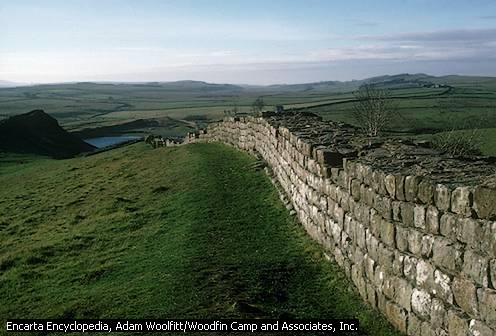
Hadrian's Wall, as it looks now. It was whitewashed originally.
The Romans did think about conquering the rest of Scotland; after all, if they ruled the whole island, they would not need any walls stretching across it. More than once legions were sent into the Highlands, where they slaughtered thousands of Picts. If they had persisted the Romans probably would have succeeded, but each time they realized that the land was too poor to support any sort of garrison, and even the Lowlands turned out to be not worth the trouble it took to keep them. The Antonine Wall was abandoned shortly after 185.
16. Hadrian's marriage to Sabina, a great-niece of Trajan, was a loveless union; they had no children. It looks like he married because an emperor is supposed to have an empress, but like many of the classical Greeks he admired, he preferred the companionship of boys. While visiting Bithynia, Hadrian picked up an attractive youth named Antinous, and he was the emperor's main interest for the next three years. Then in 130 the three of them went on a tour of Egypt, and Antinous drowned in the Nile. The grief-stricken emperor immediately ordered deification for his boy-toy from the Black Sea; a city named Antinoopolis was built on the spot where he drowned, and temples to Antinous sprang up all over the Empire. As a result, today we have about 500 statues and portraits of Antinous, which is twice as many likenesses as we have of Hadrian himself.
Antinoopolis was not in a good location for a city, either for purposes of commerce, administration or defense, so after the emperor's death, it withered away.
17. It took Gibbon nearly half a page to say that, in his usual verbose way.
18. You don't have to remember Lucius Verus. Lucius always preferred luxurious living over handling matters of state, and never seemed to mind being the junior partner of Marcus Aurelius. When he went to fight the Parthians, he let his generals win the war for him, taking for himself the titles "Armeniacus" for winning the initial battles in Armenia, "Parthicus Maximus" for defeating the Parthians in northern Mesopotamia, and "Medicus" for a successful operation in Media (modern Azerbaijan). Upon his return he received a triumph in Rome, but he was decent enough to give Marcus partial credit for the victory. Then when Marcus went to fight the Germans, he took Lucius with him, hoping the war would cure Lucius of his laziness, but Lucius got sick and died on the way back from the first campaign. Because Marcus and the generals were competent enough to make up for the shortcomings of Lucius, he avoided getting on our lists of poor emperors.
19. Ironically, the Stoic manner in which Christian martyrs accepted death did not impress him: "What an admirable soul, that is, which is ready, if at any moment it must be separated from the body . . . This readiness must come from a man's own judgment, not from mere obstinacy, as with the Christians, but with reason and dignity if it is to persuade another, and without tragic show." (Meditations XI, 3)
20. Aeneid VI, 847-853.
21. The towns of Pompeii and Herculaneum, located 13 miles from Naples, were buried by an eruption from the local volcano, Mt. Vesuvius, on August 24, 79 A.D. They were rediscovered in 1748 when a canal was dug across the site. Herculaneum was covered with mud, so it is the better preserved of the two, but the mud has hardened to rock, making it very difficult to dig out.
By contrast, Vesuvius dumped only ash on Pompeii, and over the past three centuries, careful work by archaeologists has uncovered two thirds of that town. One of the most recent discoveries was the excavation of a banqueting hall (2024). It had beautifully preserved paintings on the walls, and floor mosaics made up of nearly a million tiles.
Thousands of people in Pompeii and Herculaneum were killed by poisonous gasses from Vesuvius before they could flee. The rapid burial that followed turned both towns into excellent time capsules of everyday life in the first century. Today Pompeii is a required visit for anyone serious about studying the Romans.
22. Although literacy rates in the ancient world can only be guessed at, the statement that Roman Africa was less literate than Italy can be backed up by the ages given on local tombstones. According to US census data, 54,000 people in the United States were 100+ years old in 1990; this works out to about .002% of the population. In places where there are no birth certificates or other records to prove otherwise, many more people than this claim to be centenarians. In fact, it can be shown that the percentage of people claiming to be 100+ is inversely proportional to the percentage of those who can read and write. On their tombstones .09% of the inhabitants of ancient Rome claimed an age of 100 or more; in Africa the figure was a full 3%, with one in ten of these claiming to be over 120!
23. R. C. Trevelyan, Translations from Horace, Juvenal and Montaigne, New York, Cambridge University Press, 1941, pg. 129.
24. National Geographic, December 1962.
25. A gladiator named Bassus brought comic relief to the arena by defending himself with a gold chamber pot instead of a shield!
26. Frontinus, quoted in Michael Grant, The World of Rome, New York, New American Library, 1960, pg. 298.
27. Wells, The Outline of History, pg. 492.
28. Pliny the Elder, Natural History 2.14.117118, (trans. H. Rackham, The Loeb Classical Library), Cambridge, Harvard University Press, vol. 1, pg. 259. True to character, Pliny suffocated while he was observing the eruption of Mount Vesuvius near Pompeii, a terrible event that was described by his nephew, Pliny the Younger: "Many lifted up their hands to the gods, but a great number believed there were no gods, and that this night was to be the world's last, eternal one." (Pliny the Younger, Letters 6.16.20)
29. Galen "On Prognosis," in Thomas W. Africa, Rome and the Caesars, New York, John Wiley & Sons, 1965, pg. 217.
Support this site!

PAGE NAVIGATOR
A History of Europe
|
Other History Papers |
Beyond History
|
